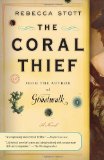Summary | Excerpt | Reviews | Beyond the Book | Readalikes | Genres & Themes | Author Bio

Critics' Opinion:
Readers' Opinion:
First Published:
Sep 2009, 304 pages
Paperback:
May 2010, 320 pages
 Book Reviewed by:
Book Reviewed by:
Sarah Sacha Dollacker
Buy This Book
“Come to be?” I said, surprised and a little alarmed. “So you think species have changed? You are a student of Professor Lamarck, the transformist?”
“I was once,” she said. “Lamarck is right about most things. Species are not fixed. Everything is changing, all the time. The animals, the people, the hills—even the little things, skin, hair, everything is constantly renewing itself, taking new shapes. Just think of what we have come from—simple sea creatures with no eyes or hearts or minds— then think of what we might yet become. Doesn’t that excite you?” She ran her fingers across the child’s face. She—Delphine, the dragonslayer—stirred, her eyes flickering open for a moment and then closing again.
“Paris is riddled with infidels,” Professor Jameson had warned me back in Edinburgh. “They are poets, these French transformists, not men of science. They dream up notions about the origins of the earth and the transmutation of species. Castles in the air. Most of them are atheists too—heretics. Steer clear.”
Jameson had not mentioned that there were women who had studied with Lamarck. I wondered what he would make of this infidel sitting beside me now. I would have to record this conversation in my notebook, I thought; Jameson would want a report. He would want to know the kind of words she used, what she had read, whom she talked to. So did I.
“It will get bigger, you know,” she said, her eyes shining in the dark with a touch of malevolence.
“What will?”
“The city. It doesn’t look so big now, at night, but it will swallow you up. Are you not afraid?”
“Yes.” I smiled. “Yes. Of course I’m afraid.”
Paris aroused complicated feelings in me then. What did I know of cities—the sound of thousands of people moving together, the tangled dealings of commerce and trade? I had always been a country boy. I knew the insides of the cave networks and mine workings of Derbyshire; I knew the angles and curves of the hills, the names of trees, ferns, lichens, and fishes; I could tell you how the light fell across the lakes, but I knew almost nothing of cities.
Edinburgh—quiet, solid, rainy Edinburgh, hewn out of the rock and built across a ravine—where I had lived and worked for four years, had overwhelmed me as a seventeen-year-old boy arriving by carriage one frosty morning. As I slipped through the crowd of Princes Street, I could scarcely feel the beginnings and ends of myself in the roar and flow of it. So I had anchored myself, establishing daily routes between the lecture theaters, the anatomy school, the libraries, museums, and taverns. Despite the best efforts of my fellow students, one of whom urged me with mock seriousness to fall in love for the sake of my health, I had lived largely in and among books.
I had seen London fleetingly, passing through from time to time on my way from Edinburgh to my family home in Derbyshire. One day in May I walked from the inn where I was staying to the optical-instrument maker’s shop in the Strand and bought a bronze-cased microscope in a velvet-lined box with money I had saved for three years. On that brief walk, London, for all its smoke and smell and noise, enraptured me. My curiosity, that shapeless thing that drove at me relentlessly, that propelled the search for origins and explanations and connections, my desire to see further and further into the insides of things that had compelled me from the day I had touched my first microscope, or turned the first page of Aristotle’s History of Animals, or opened the encyclopedia at the page marked “Anatomy,” had seemed all the more heightened in London. There were answers to be found in cities; there were libraries, instrument shops and museums and professors who knew how to pose extraordinary questions.
Excerpted from The Coral Thief by Rebecca Stott Copyright © 2009 by Rebecca Stott. Excerpted by permission of Spiegel & Grau, a division of Random House, Inc. All rights reserved. No part of this excerpt may be reproduced or reprinted without permission in writing from the publisher.





The Funeral Cryer by Wenyan Lu
Debut novelist Wenyan Lu brings us this witty yet profound story about one woman's midlife reawakening in contemporary rural China.
Your guide toexceptional books
BookBrowse seeks out and recommends the best in contemporary fiction and nonfiction—books that not only engage and entertain but also deepen our understanding of ourselves and the world around us.